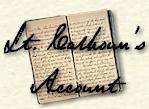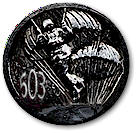
They moved the
1st, 2nd, and 4th platoons to task force headquarters to guard it. I believe
the 4th platoon may have not moved until a day or two after the 1st platoon.
The heaquarters was in a large civilian home. It was built about nine feet
above the ground. There were several rooms including a bath on the ground
level which had been built to house servants. Ed Flash, Sleepy Miller, and I
stayed here with the junior staff and service detachment officers. Field.
grade and the general occupied the regular level of the house. We thoroughly
enjoyed our quarters. The men had squad tents. They occupied dug in strong
points around the building in shifts.
A large now empty swimming pool was located just behind the house. We used
this as an air raid shelter. For the first week or so every morning about
0300-0400 hours one or two Jap planes would buzz the house. By now air raids
had greatly diminished. When the planes came over we'd rush to the swimming
pool. As time went by our rushing ceased, and we walked to the swimming
pool. The planes never dropped a bomb or even strafed, so finally one
morning we didn't get out of our sacks. This was the morning the one plane
dropped bombs. Fortunately they were small anti-personnel bombs. I don'
think but one hit the house, and it caused no damage. It shook up some of
the service personnel, though. Now they'd really been in combat.
The Japanese were directing most of their air attacks now on our shipping.
The suicide attacks had really increase4n intensity against our shipping.
The Japs now seemed to be aware that these ships were bringing in the bombs,
the ammunition, and the gasoline supplying the large air power based here.
They were daily hitting Luzon, and this expended a great amount of munitions
and fuel. At this time mention of kamikaze attacks was strictly
forbidden and to be censored in any mail going home and the writer
disciplined. Later during the battle of Okinawa these attacks broke into the
news as the Japanese's latest weapons. One evening as we were eating on the
sun porch of the main house, the regular mess for the junior officers, the
house trembled and the casement windows lining the outside wall flapped and
shook. Soon a. loud boom was heard. One of the Transportation Corps officer
had told us that four cargo ships had left Leyte a few days before bound for
Mindoro all loaded with ammunition and fuel for the Air Force. Three had
been sunk on the way. They were greatly relieved that the fourth, a Liberty
ship, had made it safely. It had just dropped anchor when he left the beach
and returned to task force headquarters.
The senior officers ate in the large dining room of the house. Colonel
William "Willie" Ryder, former Test Platoon leader, had been assigned to the
task force as an airborne observer. After the death of the chief of staff on
the "Nashville" he was appointed to take his place. I had been placed in
charge of the guard detail, so Col Ryder made me his aide, or errand boy. Ed
and Sleepy kept the guard details in good shape, and I stayed busy
performing tasks for the colonel-- and I did stay busy. The first big job
was to build a camp for civilian seamen who would not stay on their ships in
the bay. A base camp had to be set up a little later: such as Om dumps, and
APO, and other facilities to house a base command. We all enjoyed our work
though. The food was good, for once we were on the receiving end of the
better rations. Usually we had to "requisition" the better rations so they
were rare. Now it was everyday. All the men had to do was man the guard
posts. Meanwhile regiment was soon building a cantonment area across the
Bugsanga River. We felt like we were missing a lot of hard work.'
We were able to read the radio transcripts of the radio transmissions which
took place the night the Jap fleet came in. We read the conversations of the
pilots, the MTB's, and the base command at task force headquarters. A lot of
excitement took place One MTB commander with laughter told of a Jap plane
trying to suicide him. There was no laughter, though, when they yelled at
our fighters to pull up and get off their tail: because they were attacking
friendlies. Some who were not there have said the task force command ran for
the hills. The communication and command personnel certainly did not. These
I know stuck to their post. Of the others who were not assigned post I do
not know. Brigadier General Dunckel was a tough individual. He suffered
severe burns when the plane suicided the "Nashville". Many would have
relinquished their command and went to the hospital, but painful as it was
he remained at his post. Col Ryder certain]. kept the staff and headquarters
in line. There were many service personnel there at th headquarters-
aviation liaison, Transportation Corps, Quartermaster, etc.- who had no
combat function. They really had no business there that night. This
according to Ryder
Our guard post were heavily fortified and well camouflaged. A dirt street
ran alo the west side and another along the north side of the house lot.
Deep ditches bordered these streets. Heavy hedge bushes grew along the side
of the ditch. These hedges also extended around the other sides of the house
lot. This made the concealment of the guard positions easy. More than once
in inspecting the posts I found the general sitting in the sandy bottom of
the ditch drinking coffee with the men manning the posts. They made their
coffee our usual way. That was by throwing coffee grounds in a billy can of
boiling water.
Many interesting
people came to the headquarters. One such was a pair that resem bled a
grandfather and a grandson. The old man was a scarred old professional
soldier. He had served many years in the Philipine Scouts. He had boxed for
many years and his face and ears bore the signs of the many blows they had
received. The other half of this intelligence team was small, youthful
looking Filipino 2nd Lt Wolfano. Wolfano an Benny were well known and
respected intelligence agents. After our air raids began on the Philippines
the Japs desperately tried to hide their planes on the ground.
For months this
pair had smuggled a radio into airfields such as Clark Field. `they did this
shortly before air raids and aided the attacking planes in finding the
camouflaged areas that needed to be hit.
Captain John R. Richmond, Regimental S-2, came in from duty with the
guerrillas in the mountains. He had been sent in before our landing and
coordinated operations with the Filipinos.
Commander Rowe was a Naval intelligence officer who had been sent into
Mindoro in 1944 to set up an intelligence system which collected information
from the rest of the islands and passed it on to our headquarters by
submarines which sneaked in off-shore at prearranged times. Located on the
northeastern part of Mindoro across the bay from Manila this was the perfect
place for a central intelligence gathering point. Rowe was a frequent
visitor to task force headquarters.
Rowe, also, set up an extensive rescue system for downed pilots from the
Naval and later Army Air Force raids on Manila and that area. Before a
strike in the Manila Bay area hundreds of fishing bancas put out to sea to
fish. If they could get to a downed airman first they usually could snatch
him away to safety, even though it might mean lying in the bottom of the
banca covered with fish.
On Mindoro they had the "pony express system" to convey messages from
station to station until they reached Commander Rowe's camp. Most of the
Filipinos knew who the riders or agents were who moved on foot or by
caribou, but even those who collaborated with the Japs were hesitant to
tell. Those who did had the death penalty imposed upon themselves. In at
least one instance we were told that the guilty Filipino was placed in a
fifty-five gallon steel drum with the ends wired shut. The drum was
suspended horizontally by wire about three feet above the ground. A small
fire was built under the drum and tended until the culprit was dead.
We saw daily logs which had been kept on Yamashita, Homma, and other senior
Japs officers who lived in the Manila Hotel. These recorded their daily
activities down to the minute details such as time of shaving, bathing, use
of toilet facilities, social activities, etc. Obviously many of the
Filipinos working in the hotel were agents.
We enjoyed this unusual duty until late January. The men conducted
themselves as airborne, : We were sad to return to normal duty and go back
to routine training.
|


